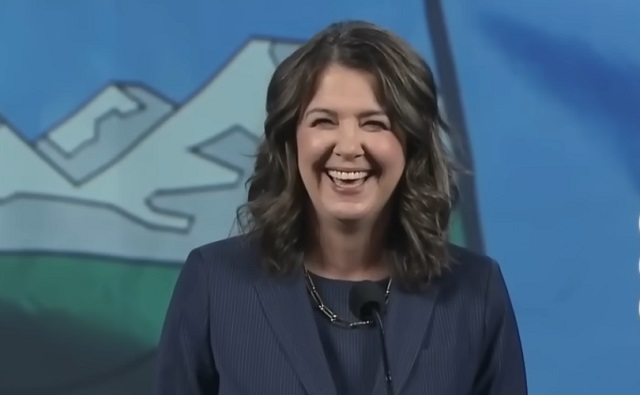Alberta
Alberta’s Danielle Smith announces new parental rights policy to be released this week

From LifeSiteNews
‘When it comes to the balancing of the parental rights with kids growing into adulthood, I don’t think that there’s anything wrong with parents wanting to protect their child’s innocence as long as possible on issues of sexuality,’ Danielle Smith said over the weekend.
Alberta is set to unveil new legislation to protect parental rights within the school system this week.
On January 27, Alberta Premier Danielle Smith announced that this week her United Conservative Party (UPC) will publish a new parental rights policy after promising the legislation last November.
“We’ll be releasing policy about this next week and I’m really hopeful that we can depoliticize the discussion and be thinking about the kids who are listening to us adults, talking about these issues that are impacting them and making sure we get the right balance,” Smith told the audience of her Corus radio call-in show.
Smith’s comments came in response to a caller named Linda who referenced Smith’s promises during the UPC’s annual general meeting (AGM) and questioned when Smith would introduce “an Alberta parental rights bill.”
“I want every parent listening today to hear me loud and clear. Parents are the primary caregivers and educators of their children,” Smith had promised at the AGM last November.
“Regardless of how often the extreme left undermines the role of parents, I want you to know that parental rights and choice in your child’s education is and will continue to be a fundamental core principle of this party and this government, and we will never apologize for it,” she declared.
In November, UPC members passed a slew of pro-family, medical freedom, and anti-woke policies at its AGM, including one calling for a bill to support “comprehensive parental rights” in education. While the policies are non-binding, merely serving as suggestions for the Alberta government, Smith told reporters at the time that her government does support the party’s grassroots process.
During Saturday’s show, Smith revealed that consultations have taken place about such a policy, and that new legislation will be published shortly.
“When it comes to the balancing of the parental rights with kids growing into adulthood, I don’t think that there’s anything wrong with parents wanting to protect their child’s innocence as long as possible on issues of sexuality. I think that that’s a good instinct,” she told the caller.
“But they do get to a point where they start making their own decisions and so that’s the balance that we’re trying to get to, is how do we make sure that we’re supporting children as they grow into adults to become the people they want to be, while making sure that parents also have the right to ensure that materials in education and exposure to some of these discussions happen at an age-appropriate level?” Smith questioned.
Smith’s promise comes after both Saskatchewan and New Brunswick introduced legislation to protect parental rights despite incurring the ire of many in the LGBT community.
Last September, Saskatchewan Premier Scott Moe invoked his government’s notwithstanding clause to protect legislation mandating that parents be told if their child changes “genders” at school; a judge had ruled against enforcement of the law earlier that day.
The notwithstanding clause, embedded in section 33 of the Canadian Charter of Rights and Freedoms, allows provinces to temporarily override sections of the Charter of Rights and Freedoms to protect new laws from being scrapped by the courts.
Saskatchewan had followed the example of New Brunswick Premier Blaine Higgs, who earlier in 2023 had been condemned by LGBT activists for reviewing the province’s “gender identity” policy that allowed schools to hide students’ “transgender” status from parents.
“For [a desire to be identified with the opposite sex] purposefully to be hidden from the parents, that’s a problem,” Higgs told reporters at the time.
In early August, pro-LGBT politicians tried unsuccessfully to remove Higgs from office. Their failure led Progressive Conservative Party members to say that, despite the media backlash, Higgs has the support of the “silent majority.”
According to an August 2023 survey, 86 percent of Saskatchewan-based participants are for parental rights and support the province’s new laws.
There have also been numerous protests against the LGBT agenda in schools, including the September 2023 “Million Person March” which drew thousands of Canadians from across the country.
Alberta
Alberta will defend law-abiding gun owners who defend themselves

Alberta’s government will introduce a motion under the Alberta Sovereignty within a United Canada Act to defend law-abiding firearms owners.
A new motion under the Alberta Sovereignty within a United Canada Act will, if passed by the legislature, instruct all provincial entities, including law-enforcement agencies such as municipal police services and the RCMP, to decline to enforce or implement the federal gun seizure program. The motion also makes clear that Albertans have the right to use reasonable force to defend themselves, their families and their homes from intruders.
This builds on the steps Alberta has already taken to reduce crime, strengthen public safety and assert provincial jurisdiction over firearms. This includes passing the Alberta Firearms Act to establish the Alberta Chief Firearms Office, along with the Alberta Firearms Regulation and the Seizure Agent and Provider Licensing Regulation.
“It’s time for Ottawa to stop targeting the wrong people. Albertans have the right to protect their homes and their families. No one should hesitate to defend themselves when faced with a threat at their own doorway. Law-abiding citizens, hunters, farmers and sport shooters are not the source of violent crime, yet the federal government wants to confiscate their property while illegal guns pour across our borders. Alberta will not stand by while responsible gun owners are treated like criminals. This motion is about using every legal tool we have to protect their rights, uphold public safety and push back on federal overreach into provincial jurisdiction.”
“When someone breaks into your home, the law recognizes that you have enhanced rights to protect yourself and your family. Alberta is making that principle unmistakably clear: lawful, reasonable self-defence will be respected, not criminalized.”
“As an experienced former law enforcement officer, law-abiding gun owners have never been an issue, in my own personal experience, nor has there been any data to support that law-abiding gun owners are the ones that are committing violent gun crimes. The illegal guns that you see being used by criminals are typically being smuggled in from the United States. The federal government should help us strengthen the border, helping us to stop illegal guns from coming into Canada. This would further enhance safety and security for the people of Alberta and Canada as opposed to going after lawful gun owners.”
Under the Alberta Firearms Regulation, municipalities, law enforcement and police commissions must obtain approval from Alberta’s Minister of Justice before accepting funding to participate in the Assault-Style Firearms Compensation Program.
“Misguided federal initiatives such as the handgun transfer ban and the Order in Council firearms prohibitions of 2020, 2024 and 2025 have had a devastating impact on the safe, legitimate activities of the firearms community and the businesses that support it, while having no discernible effect on criminal activity. I am proud to see that the Alberta government is pushing back and supporting lawful firearms owners through these measures.”
“Licensed gun owners and all Albertans can rest assured that their government, under the leadership of the UCP, is laser focused on protecting law abiding citizens while prioritizing real public safety.”
“The Alberta Hunter Education Instructors Association will continue to support our government and the Alberta chief firearms officer in our joint quest to use safety training and education as the key tools to ensure we have safer streets and communities. Safe and responsible use of firearms in Alberta is a key part of our heritage, culture, and our rich and precious heritage.”
Key facts:
- Pursuant to the Attorney General’s recent guidance protocols, Alberta’s prosecutors will decline to prosecute offences under the federal gun seizure program when it is not in the public interest.
- The Attorney General’s recent guidance protocol directs prosecutors to not prosecute home defence offences when it is not in the public interest.
- Total spending on the federal Assault-Style Firearms Compensation Program is expected to exceed $750 million.
- The firearms motion considers the Alberta Bill of Rights, the Constitution Act, 1867 and the Criminal Code.
- Currently 10 per cent of adult Albertans are licenced to use and own firearms. There are 381,900 firearms licences in Alberta.
- Alberta has 638 licensed firearms businesses, 138 shooting ranges and 91 shooting clubs.
Alberta
Emissions Reduction Alberta offering financial boost for the next transformative drilling idea

From the Canadian Energy Centre
$35-million Alberta challenge targets next-gen drilling opportunities
‘All transformative ideas are really eligible’
Forget the old image of a straight vertical oil and gas well.
In Western Canada, engineers now steer wells for kilometres underground with remarkable precision, tapping vast energy resources from a single spot on the surface.
The sector is continually evolving as operators pursue next-generation drilling technologies that lower costs while opening new opportunities and reducing environmental impacts.
But many promising innovations never reach the market because of high development costs and limited opportunities for real-world testing, according to Emissions Reduction Alberta (ERA).
That’s why ERA is launching the Drilling Technology Challenge, which will invest up to $35 million to advance new drilling and subsurface technologies.
“The focus isn’t just on drilling, it’s about building our future economy, helping reduce emissions, creating new industries and making sure we remain a responsible leader in energy development for decades to come,” said ERA CEO Justin Riemer.
And it’s not just about oil and gas. ERA says emerging technologies can unlock new resource opportunities such as geothermal energy, deep geological CO₂ storage and critical minerals extraction.
“Alberta’s wealth comes from our natural resources, most of which are extracted through drilling and other subsurface technologies,” said Gurpreet Lail, CEO of Enserva, which represents energy service companies.
ERA funding for the challenge will range from $250,000 to $8 million per project.
Eligible technologies include advanced drilling systems, downhole tools and sensors; AI-enabled automation and optimization; low-impact rigs and fluids; geothermal and critical mineral drilling applications; and supporting infrastructure like mobile labs and simulation platforms.
“All transformative ideas are really eligible for this call,” Riemer said, noting that AI-based technologies are likely to play a growing role.
“I think what we’re seeing is that the wells of the future are going to be guided by smart sensors and real-time data. You’re going to have a lot of AI-driven controls that help operators make instant decisions and avoid problems.”
Applications for the Drilling Technology Challenge close January 29, 2026.
-

 National1 day ago
National1 day agoMedia bound to pay the price for selling their freedom to (selectively) offend
-

 Business1 day ago
Business1 day agoIs there a cure for Alzheimer’s Disease?
-

 Bruce Dowbiggin1 day ago
Bruce Dowbiggin1 day agoSometimes An Ingrate Nation Pt. 2: The Great One Makes His Choice
-

 Alberta1 day ago
Alberta1 day agoNew era of police accountability
-

 C2C Journal1 day ago
C2C Journal1 day agoLearning the Truth about “Children’s Graves” and Residential Schools is More Important than Ever
-

 Energy2 days ago
Energy2 days agoCanadians will soon be versed in massive West Coast LPG mega-project
-

 Artificial Intelligence2 days ago
Artificial Intelligence2 days ago‘Trouble in Toyland’ report sounds alarm on AI toys
-

 Brownstone Institute1 day ago
Brownstone Institute1 day agoThe Unmasking of Vaccine Science






